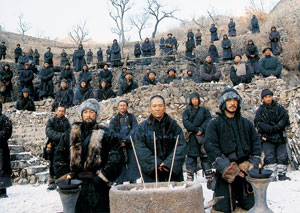ESTIMATES of the butcher’s bill disagree: the Taiping rebellion of the mid-1800s killed 20 or maybe 50 million humans. Clearly, it was Earth’s bloodiest civil war. Without delving into the history too much—I’m a non-Chinese speaker sorting through drastically partisan summings up—a couple of things can be judged.
Firstly, in the golden hindsight of Mao and the Party, the rebellion was proto-communist, since the rebels held property in common and came out against polygamy and foot binding. “Perhaps the next uprising in Europe may depend more on what is now taking place in the Celestial Empire [China] than any other existing political cause,” wrote Karl Marx at the time. As in the later Boxer Rebellion, the rebellion opposed the colonizing attempts of the West. Secondly, Hong Xiuquan, the rebellion’s leader, may have been of dubious sanity, since he was subject to prophetic dreams in which God told him that he, Hong, was Jesus’ little brother. Beware the divinely inspired when they have guns.
Making a film about a civil war, Chinese or otherwise, is always tricky: what half the audience will consider heroism, the other half will call base treachery. Gone With the Wind is the exception that proves Thalberg’s Law: No Civil War picture ever made a dime. Peter Chan’s The Warlords, a sumptuously produced yet gritty war movie, might also be an exception. It’s a rousing martial drama of the brotherhood of three generals and the woman who became the wedge between them.
Left for dead after a four-day battle, the Imperial Gen. Pang (Jet Li) survives by playing possum in a burnt-out city. A lone woman, Lian (Xu Jinglei), rescues, feeds and beds the traumatized Pang. Lian had just run away from the man in her life, a bandit chieftain named Zhao Erhu (Andy Lau). In the morning after this one-night encounter, Pang and Lian meet the bandit’s party. Zhao never learns about the stolen night of love; he intends to send Pang on his way.
That’s when a different division of the Imperial army shows up, led by Pang’s evil rival, who sat out the battle as Pang’s men were cut to pieces. This marauding general raids the bandit’s camp. These well-staged sequences bring out The Warlord‘s Goya side: the torment of the civilians is well observed with crane shots of evilly glittering rifles, like jackstraws, jabbed into the necks of an undulating crowd.
After the thieving soldiers withdraw, Pang urges the bandits to join the emperor’s army as a way of surviving the times. Pang, the bandit Zhao and the film’s narrator, Zhang (Takeshi Kaneshiro of Red Cliff), join in a three-way oath to fight together as brothers. They seal this oath with the murder of some hostages: blood in, blood out.
The battles continue the film’s postapocalyptic look—it’s a gritty modern war with trenches. There’s more hit-and-run action in the early sequences, as Pang, Zhang and Zhao’s militia falls on a Taiping supply convoy filing through the canyons: bear traps snatch their horses’ legs, and the fighters slide down from the cliff tops to finish the slaughter.
A later battle outside the gates of Shu City plays out as a more ghastly version of the Charge of the Light Brigade, with foot soldiers throwing themselves into the line of gunfire to buy time for the archers behind them.
Success changes everything: Pang grows more ruthless, more of a cold-blooded politician, even as Zhao’s own populist side broadens. Meanwhile, conniving do-nothing mandarins at the Imperial court wait to see which way the chips will fall.
The Warlords isn’t quite bursting with comedy, but there is some dark humor in the staging of Pang’s meetings with the civil authorities. Pang and the throne’s servants negotiate at shouting distance across the city’s concrete courtyard, like neighbors yelling at each other across a street.
We get a taste of the martial arts that made Jet Li famous, as during the scrimmage at Shu City: the general, impaled with a pike, lets his attacker force the pole through his body so he can lure the sucker into slicing range. Surely, this is the most grisly-cool moment since Shirley MacLaine taught Clint Eastwood the proper way to remove an arrow in Don Siegel’s Two Mules for Sister Sara. Li tops it by hurling opponents hard enough to knock a line of cannons off their caissons.
The digitally enhanced stunts with Li are essential to the film’s appeal, but it’s strange that director Peter Chan didn’t show us the story from the point of view of the bandit Zhao: in trusting the authorities, he risks the most and has the most to lose; he goes noble as his well-born rival goes ignoble.
The Warlords is directed with admirable momentum, intelligence and minimal borrowing from Kurosawa. The hyperkinetic and realistic sides of war are balanced, as are the glory and the shame. The sense of the busted trust between generals reminds one of something director Claude Autant-Lara once wrote. In movies, he suggested, “the ‘comradery of war’ is presented with incomparable deceit as a ‘brotherhood’ … a false brotherhood … that I challenge absolutely, having some true sense of brotherhood, of its nature and of its ends.”
THE WARLORDS (R; 110 min.), directed by Peter Chan, written by Chun Tin Nam, et al., photographed by Arthur Wong and starring Jet Li and Andy Lau, opens April 9 at Camera 3 in San Jose.



